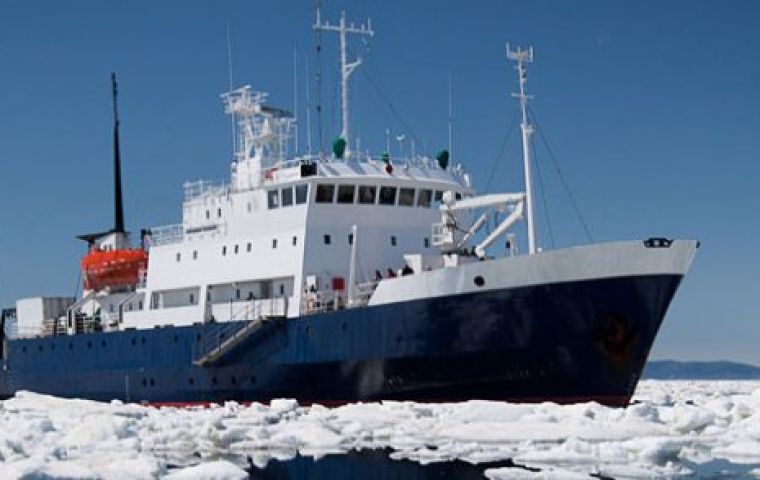MercoPress. South Atlantic News Agency
Russian and Chinese vessels break loose from Antarctic ice
 MV Akademik Shokalskiy caught in Commonwealth Bay on Christmas Day had to also spend New Year surrounded by ice
MV Akademik Shokalskiy caught in Commonwealth Bay on Christmas Day had to also spend New Year surrounded by ice The Australian Maritime Safety Authority (AMSA) confirmed Wednesday that the entrapped Antarctic ships, the Akademik Shokalskiy and the Xue Long (Snow Dragon), have broken free from the ice in Antarctica and are no longer in need of assistance.
The US Coast Guard ice breaker Polar Star has been released from search and rescue tasking by AMSA's Rescue Coordination Centre (RCC Australia) and will now continue on its original mission to McMurdo Sound.
AMSA said at 0830 GMT on Tuesday that RCC Australia received a message from the Captain of the Akademik Shokalskiy, stating that about three hours earlier cracks had started to open in the ice around the trapped vessel.
A short time later the Akademik Shokalskiy began to make slow movements in an attempt to break free from surrounding ice. The captain reported that at 8 p.m. they had managed to successfully clear the area containing the heaviest ice and had begun making slow progress north through lighter ice conditions.
Another half an hour later, the Akademik Shokalskiy informed RCC Australia that it had cleared the ice field and was no longer in need of assistance.
The captain of the Akademik Shokalskiy passed on his thanks to all those who assisted the vessel and informed the RCC that they will now proceed to Bluff in New Zealand.
Shortly after midnight, RCC Australia was advised by the captain of the Xue Long that, at about 9 p.m., it too had managed to break free of the heavy ice and is now making slow progress through lighter ice conditions.
The Xue Long advised RCC Australia on Wednesday morning that it is not in need of assistance and will continue its research mission in Antarctica.
AMSA offers thanks to all of the participants in their efforts to assure a safe resolution to the situations that emerged following the incident experienced by MV Akademik Shokalskiy in Commonwealth Bay on Christmas Day.
In total, five ships were involved in the multi-lateral cooperative effort, including Akademik Shokalskiy of Russia, L' Astrolabe of France, Xue Long of China, Aurora Australis of Australia and USCGC Polar Star of the United States.
AMSA also noted that Germany and the United States have been engaged in actual operational responses, contingency planning or the provision of specialist data. “This was a great example of the multi-lateral cooperative nature of Antarctic operations ”said AMSA Acting CEO Mick Kinley.




Top Comments
Disclaimer & comment rules-

-

-

Read all commentsGreat!
Jan 08th, 2014 - 10:15 am 0Hoo-rah!
Jan 08th, 2014 - 10:17 am 0And still nothing from, what's that place, argieland? Doesn't it own everything? But I forgot. Argieland doesn't have an icebreaker of its own. The one it did have is still “undergoing repairs”. It had a little fire in 2007. It lost two helicopters worth US$36 million. Then there's the leasing of a Russian icebreaker for around US$120 million. Then there's the US$275 million for the repairs and upgrades. That's US$431 million. Incidentally, the helicopters! They were replaced by four more “transferred from the US government”. No figures. Call it US$72 million. Grand total US$503 million. And the Royal Navy's (new) research vessel/icebreaker, HMS Protector, cost US$87.04 million. It's beyond me how argieland gets into financial difficulties!
Jan 08th, 2014 - 01:01 pm 0Commenting for this story is now closed.
If you have a Facebook account, become a fan and comment on our Facebook Page!